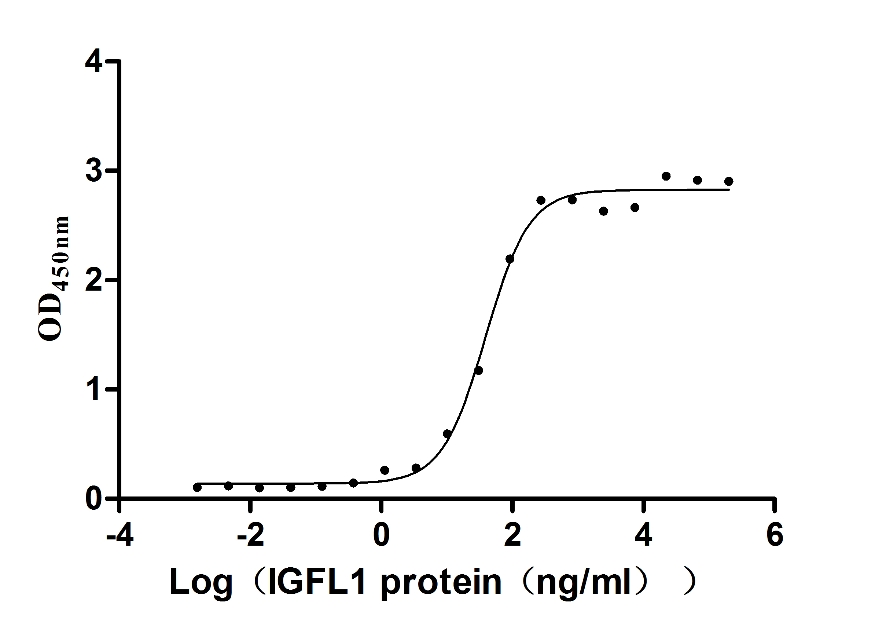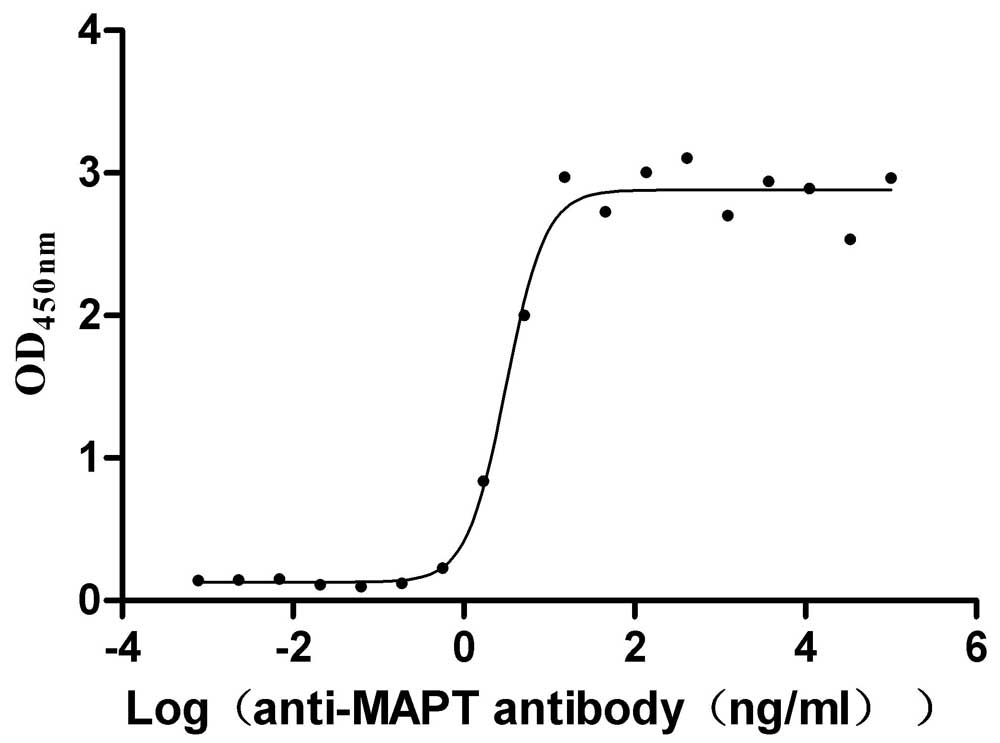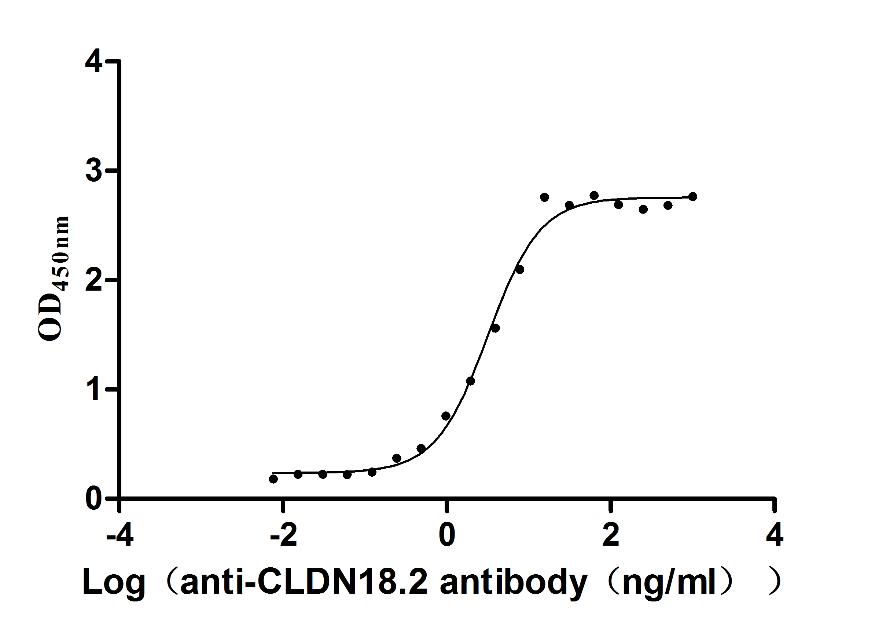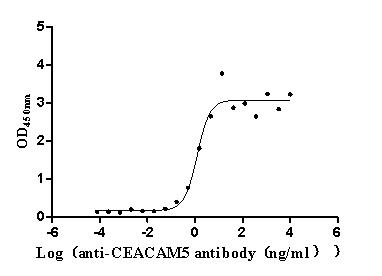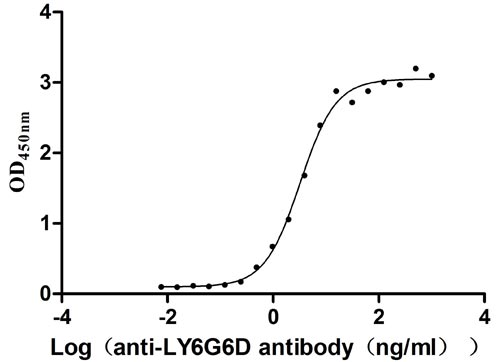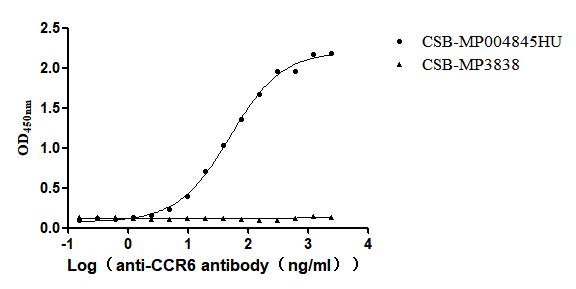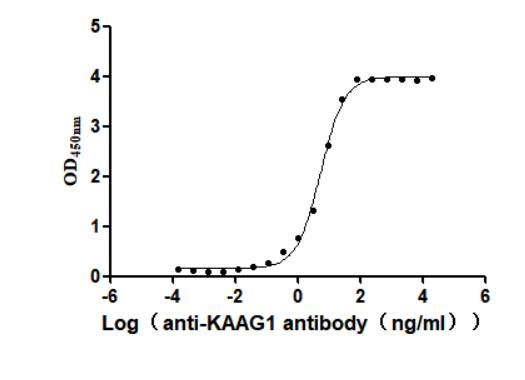Recombinant Human Calsequestrin-2 (CASQ2)
-
货号:CSB-YP004557HU
-
规格:
-
来源:Yeast
-
其他:
-
货号:CSB-EP004557HU
-
规格:
-
来源:E.coli
-
其他:
-
货号:CSB-EP004557HU-B
-
规格:
-
来源:E.coli
-
共轭:Avi-tag Biotinylated
E. coli biotin ligase (BirA) is highly specific in covalently attaching biotin to the 15 amino acid AviTag peptide. This recombinant protein was biotinylated in vivo by AviTag-BirA technology, which method is BriA catalyzes amide linkage between the biotin and the specific lysine of the AviTag.
-
其他:
-
货号:CSB-BP004557HU
-
规格:
-
来源:Baculovirus
-
其他:
-
货号:CSB-MP004557HU
-
规格:
-
来源:Mammalian cell
-
其他:
产品详情
-
纯度:>85% (SDS-PAGE)
-
基因名:CASQ2
-
Uniprot No.:
-
别名:AA033488; AW146219 ; Calsequestrin 2 (cardiac muscle); Calsequestrin 2 fast twitch cardiac muscle; Calsequestrin; Calsequestrin cardiac muscle isoform; Calsequestrin fast twitch cardiac muscle; Calsequestrin-2; Calsequestrin2; cardCSQ; Cardiac calsequestrin 2; cardiac muscle isoform; CASQ 2; CASQ2; CASQ2_HUMAN; cCSQ; ESTM52; FLJ26321; FLJ93514; PDIB2
-
种属:Homo sapiens (Human)
-
蛋白长度:Full Length of Mature Protein
-
表达区域:20-399
-
氨基酸序列E EGLNFPTYDG KDRVVSLSEK NFKQVLKKYD LLCLYYHEPV SSDKVTQKQF QLKEIVLELV AQVLEHKAIG FVMVDAKKEA KLAKKLGFDE EGSLYILKGD RTIEFDGEFA ADVLVEFLLD LIEDPVEIIS SKLEVQAFER IEDYIKLIGF FKSEDSEYYK AFEEAAEHFQ PYIKFFATFD KGVAKKLSLK MNEVDFYEPF MDEPIAIPNK PYTEEELVEF VKEHQRPTLR RLRPEEMFET WEDDLNGIHI VAFAEKSDPD GYEFLEILKQ VARDNTDNPD LSILWIDPDD FPLLVAYWEK TFKIDLFRPQ IGVVNVTDAD SVWMEIPDDD DLPTAEELED WIEDVLSGKI NTEDDDEDDD DDDNSDEEDN DDSDDDDDE
-
蛋白标签:Tag type will be determined during the manufacturing process.
The tag type will be determined during production process. If you have specified tag type, please tell us and we will develop the specified tag preferentially. -
产品提供形式:Lyophilized powder
Note: We will preferentially ship the format that we have in stock, however, if you have any special requirement for the format, please remark your requirement when placing the order, we will prepare according to your demand. -
复溶:We recommend that this vial be briefly centrifuged prior to opening to bring the contents to the bottom. Please reconstitute protein in deionized sterile water to a concentration of 0.1-1.0 mg/mL.We recommend to add 5-50% of glycerol (final concentration) and aliquot for long-term storage at -20℃/-80℃. Our default final concentration of glycerol is 50%. Customers could use it as reference.
-
储存条件:Store at -20°C/-80°C upon receipt, aliquoting is necessary for mutiple use. Avoid repeated freeze-thaw cycles.
-
保质期:The shelf life is related to many factors, storage state, buffer ingredients, storage temperature and the stability of the protein itself.
Generally, the shelf life of liquid form is 6 months at -20°C/-80°C. The shelf life of lyophilized form is 12 months at -20°C/-80°C. -
货期:Delivery time may differ from different purchasing way or location, please kindly consult your local distributors for specific delivery time.Note: All of our proteins are default shipped with normal blue ice packs, if you request to ship with dry ice, please communicate with us in advance and extra fees will be charged.
-
注意事项:Repeated freezing and thawing is not recommended. Store working aliquots at 4°C for up to one week.
-
Datasheet :Please contact us to get it.
相关产品
靶点详情
-
功能:Calsequestrin is a high-capacity, moderate affinity, calcium-binding protein and thus acts as an internal calcium store in muscle. Calcium ions are bound by clusters of acidic residues at the protein surface, especially at the interface between subunits. Can bind around 60 Ca(2+) ions. Regulates the release of lumenal Ca(2+) via the calcium release channel RYR2; this plays an important role in triggering muscle contraction. Plays a role in excitation-contraction coupling in the heart and in regulating the rate of heart beats.
-
基因功能参考文献:
- We show for the first time a heterozygous CASQ2 variant causing autosomal dominant CPVT in a large family with a severe phenotype. PMID: 27157848
- a direct interaction exists between RyR2 and CSQ2, is reported. PMID: 27609834
- induced Pluripotent Stem Cell-derived cardiomyocytes are useful for investigating the similarities/differences in the pathophysiological consequences of RyR2 versus CASQ2 mutations underlying Catecholaminergic polymorphic ventricular tachycardia. PMID: 26153920
- Mutations in the MYBPC3 and CASQ2 genes and six combinations between loci in the MYBPC3, MYH7 and CASQ2 genes were responsible for cardiomyopathy risk in a studied cohort. PMID: 25892673
- We observed association between a CASQ2 polymorphism and SCA due to VA in patients with CAD adjusting for CHF and independent associations between CASQ2 SNPs and CHF adjusting for SCA. PMID: 24444446
- Molecular analysis of the CASQ2 gene in 43 probands with Catecholaminergic polymorphic ventricular tachycardia were performed and eight mutations in five patients, were identified. PMID: 21618644
- Genetic background of catecholaminergic polymorphic ventricular tachycardia in Japan. PMID: 23595086
- In a consanguineous family, a novel homozygous CASQ2 mutation (p.L77P) was identified in a child with CPVT who required implantation of a cardioverter defibrillator due to episodes of syncope while on medical therapy PMID: 22650415
- A review of the physiology of Casq2 in cardiac Ca2+ handling and discuss pathophysiological mechanisms that lead to catecholaminergic polymorphic ventricular tachycardia caused by CASQ2 mutations. PMID: 22421959
- patients with CASQ2-associated CPVT should be recommended to receive ICDs to prevent sudden death when medical therapy is not effective. PMID: 22481011
- Aspartate to histidine casq2 mutation causes arrhythmia in cardiomyocytes generated from catecholaminergic polymorphic ventricular tachycardia patients. PMID: 22050625
- Ca(2+) and JNT-dependent disassembly of the CSQ2 polymer PMID: 22123818
- Two causative genes of CPVT have been identified: RYR2, encoding the cardiac ryanodine receptor (RyR2) Ca(2+) release channel, and CASQ2, encoding cardiac calsequestrin. Their mutation have been found in 60% of patients with CPVT. PMID: 21872879
- Common variations in or near CASQ2, GPD1L, and NOS1AP are associated with increased risk of sudden cardiac death in patients with coronary artery disease PMID: 21685173
- Studies identified two phosphorylation sites, Ser(385) and Ser(393 in hCASQ2 by mass-spectroscopy. PMID: 21416293
- Catecholaminergic polymorphic ventricular tachycardia (CPTV) mutations modify CASQ2 behaviour, including folding, aggregation/polymerization and selectivity towards Ca2+. PMID: 21265816
- up-regulation of casq2 gene in the thyroid of patients with Graves' Hyperthyroidism may lead to the production of autoantibodies and sensitized T-lymphocytes, which cross-react with calsequestrin of patients who develop ophthalmopathy. PMID: 20039900
- A regulatory role of CASQ2 on cytosolic Ca(2+) and hERG channels which may contribute to the etiology of CPVT. PMID: 21063088
- The human CASQ2 mutation K206N is associated with hyperglycosylation and altered cellular calcium handling. PMID: 20302875
- missense mutation in a highly conserved region of CASQ2 is associated with autosomal recessive catecholamine-induced polymorphic ventricular tachycardia in Bedouin families from Israel PMID: 11704930
- calsequestrin 2 mutations causes severe forms of catecholaminergic polymorphic ventricular tachycardia PMID: 12386154
- missense mutation in the CASQ2 gene is associated with autosomal-recessive CPVT(catecholamine-induced polymorphic ventricular tachycardia). PMID: 12732448
- A missense mutation in a highly conserved region of CASQ2 is associated with autosomal recessive catecholamine-induced polymorphic ventricular tachycardia in Bedouin families from Israel. PMID: 12858557
- Intracellular Ca2+ cycling in normal heart relies on intricate interplay of CASQ2 with proteins of RyR2 channel complex, and disruption of these interactions can lead to cardiac arrhythmia. PMID: 16601229
- CASQ2 mutations identified in polymorphic ventricular tachycardia create distinct abnormalities that lead to abnormal intracellular calcium regulation, thus facilitating the development of tachyarrhythmias. PMID: 16908766
- CSQ was a highly phosphorylated protein with a glycan structure predictive of ER-retained proteins. PMID: 17045261
- A variant was identified in CASQ2. PMID: 17655857
- Data show that all three CPVT-related missense mutations lead to significant reduction in Ca2+-binding capacity and scattering experiments confirm that the linear polymerization behavior of CSQ is linked directly to its high-capacity Ca2+ binding. PMID: 17881003
- analysis of how human and rat CASQ2 ventricular tachycardia-related mutations R33Q and L167H alter calcium sensitivity PMID: 18399795
- study concludes CASQ2 in the sarcoplasmic reticulum (SR )determines magnitude & duration of Ca release from each SR terminal; 2 CPVT-inducing CASQ2 mutations lead to increased diastolic SR Ca release events and exhibit a similar CPVT disease phenotype PMID: 18469084
- A novel mutation of F189L in the CASQ2 gene was identified in families with catecholaminergic polymorphic ventricular tachycardia. PMID: 18543230
- REVIEW of Casq2 mutations that cause catecholaminergic polymorphic ventricular tachycardia and their effects on Casq2 function and Ca handling PMID: 18669926
- Facilitated maturation of Ca2+ handling properties of human embryonic stem cell-derived cardiomyocytes by calsequestrin expression. PMID: 19357236
- Data suggest that calsequestrin (CSQ)2 facilitates Ca(2+) release through RyR2 during systole, while CSQ1 curtails RyR1 opening to maintain Ca(2+) and allow repeated release/ graded activation with increased stimulation frequency. PMID: 19376574
- Cardiac and fatal or near-fatal events were not rare in both catecholaminergic polymorphic ventricular tachycardia RYR2 and a CASQ2 mutation probands and affected family members during the long-term follow-up PMID: 19398665
显示更多
收起更多
-
相关疾病:Ventricular tachycardia, catecholaminergic polymorphic, 2 (CPVT2)
-
亚细胞定位:Sarcoplasmic reticulum lumen.
-
蛋白家族:Calsequestrin family
-
数据库链接:
HGNC: 1513
OMIM: 114251
KEGG: hsa:845
STRING: 9606.ENSP00000261448
UniGene: Hs.57975
Most popular with customers
-
Recombinant Human Insulin growth factor-like family member 1 (IGFL1) (Active)
Express system: Mammalian cell
Species: Homo sapiens (Human)
-
Recombinant Macaca mulatta Microtubule-associated protein tau (MAPT) (Active)
Express system: Mammalian cell
Species: Macaca mulatta (Rhesus macaque)
-
Recombinant Mouse Tyrosine-protein kinase Mer (Mertk), partial (Active)
Express system: Mammalian cell
Species: Mus musculus (Mouse)
-
Recombinant Macaca fascicularis Claudin (CLDN18)-VLPs (Active)
Express system: Mammalian cell
Species: Macaca fascicularis (Crab-eating macaque) (Cynomolgus monkey)
-
Express system: Mammalian cell
Species: Homo sapiens (Human)
-
Recombinant Human Lymphocyte antigen 6 complex locus protein G6d (LY6G6D) (Active)
Express system: Yeast
Species: Homo sapiens (Human)
-
Recombinant Human C-C chemokine receptor type 6(CCR6)-VLPs (Active)
Express system: Mammalian cell
Species: Homo sapiens (Human)
-
Recombinant Human Kidney-associated antigen 1(KAAG1) (Active)
Express system: Baculovirus
Species: Homo sapiens (Human)


